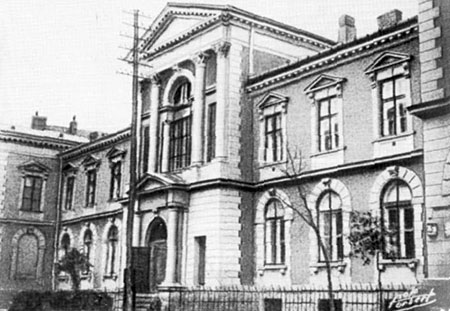In the interwar period he was an award-winning journalist. He received the Silver Cross of Merit from the Poland’s Government. Bencjon worked for the Warsaw daily newspaper Der Moment. In 1941, during the German occupation, he was among the Jewish elite of the Warsaw ghetto who were making plans to establish their own independent Jewish newspaper.
Bencjon was born in Lomza. He received a thorough rabbinical education as a Hasid, but under the influence of the 1905 revolution he discontinued his studies in this area and, as a self-taught scholar, began to acquire secular knowledge. He quickly abandoned the Orthodox tradition completely and took up journalism in Warsaw. He first moved from Lomza to Bialystok, from where he arrived in Warsaw in 1910. Here he initially worked for two years as a modest office worker.
His writing skills were quickly recognised and, as a talented journalist and supporter of Zionism, he began co-editing the daily newspaper Der Moment from 1912. His texts became popular in 1920, when he became the parliamentary rapporteur of this newspaper. At the same time, he became involved in the life of the capital’s journalistic community. He was a co-founder of the Sejm Rapporteurs’ Club, vice-president of the Jewish Section of the Syndicate of Warsaw Journalists, and co-founder and vice-president of the Union of Jewish Writers and Journalists in Poland.
He wrote under the following pseudonyms: Ben-Cjon, Ben-Odem, Ben-Cemech, Choli and Wicz. He published not only articles, columns or reports in the Jewish press, but also novels and short stories.
During the occupation, Khilinovich stayed in the Warsaw Ghetto, where he headed the press report for the American Jewish Joint Distribution Committee and was a member of the so-called “Economic Committee”. These official functions did not satisfy him, however. He believed that the Jewish community should establish an independent newspaper. This was to be a counterbalance to the collaborationist “Gazeta Żydowska” published in the ghetto. He agreed these plans with the president of the Warsaw Judenrat, Adam Czerniakow. Unfortunately, these intentions were not realised, but it is worth highlighting the efforts in this direction, as they became an admirable manifestation of Jewish resistance during the Holocaust. Eventually, they ended up obtaining permission from the ghetto authorities to establish a wall newspaper in which Jews found encouraging information, in addition to announcements.
Khilinovich and his family died in the Treblinka extermination camp in 1942.





